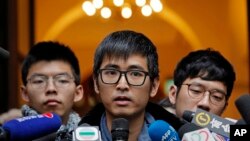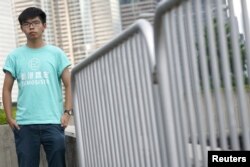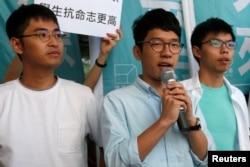The original architects of Hong Kong’s 2014 Umbrella Movement are set to go on trial next Monday and face possible jail time as the city’s courts continue to prosecute protest leaders four years after the massive demonstrations came to an end.
Benny Tai, Chan Kinman and Reverend Chu Yiu-ming all face charges of conspiracy to commit a public nuisance, incitement to commit a public nuisance, and “incitement to incite” public nuisance. They now face up to seven years in prison.
The trio originally proposed what became known as the "Umbrella Movement" in 2013 under the banner “Occupy Central With Love and Peace.”
While the protests took their cue from "Occupy Wall Street" in New York, Hong Kong protesters demanded universal suffrage to elect the city’s top leader.
Chan said the group expected a backlash for their leadership role but they could not have anticipated how much harder the courts have come down on demonstrations in the past four years.
“We already understand that taking civil disobedience action that we might have to shoulder the legal consequence. But before that in fact for people who took action of similar kind they would just be charged for unauthorized assembly or participation in unlawful assembly,” Chan said.
“We already prepared for it and understood that there may be serious consequences for our jobs as professors, but we never expected they would have this kind of very peculiar charge which now can have a maximum penalty of seven years of imprisonment,” he said.
Unlike many of the Umbrella Movement’s youthful leaders, such as Joshua Wong, who became one of the most globally recognized faces of the protest at age 18, Chan and Tai are both respected professors in their fifties while Chu is a Baptist minister.
“They are the prominent and senior leaders in the democracy movement of Hong Kong. They have fought for democracy even earlier than I was born,” Wong said of the group. “So especially Reverend Chu I am really worried about if the judges lock him up in prison at the age of more than [seventy] years old it will really be trouble.”
The trio will take the stand alongside six other defendants facing similar charges, including current pro-democracy legislators Tanya Chan and Shiu Ka-chun and four other student and political leaders. Together the group has been dubbed the “Umbrella Nine” by the media.
The Department of Justice said the case was being prosecuted four years after the protest due to its complexity and the amount of evidence involved.
"The number of people arrested in the "Occupy Movement" in 2014 is large and the evidence collated is voluminous. Hence, the Department of Justice required time to study and examine the relevant materials, analyse legal issues and provide detailed legal advice to the police on the appropriate way forward for each relevant person under investigation,” a spokesman told VOA by email.
The DOJ however said it could not comment on the kinds of the charges applied in the Umbrella Nine trial or their impact on Hong Kong society as the case is ongoing. It also said it did not keep statistics on how many people have been prosecuted in relation to the Umbrella Movement.
Starting from early September 2014, Umbrella Movement protesters took over several districts of Hong Kong for 79 days demanding the direct election of the city’s top leader after Beijing made clear it would renege on promises of universal suffrage by 2017.
In total, 220 protesters associated with the Umbrella Movement have been prosecuted since the end of 2014, with 78 convicted, according to a list compiled by rights activist Kong Tsung-gan, who monitors the trials on his blog. The most recent included the prosecution of a 72 year-old homeless man, who was handed four months in prison in October.
Protest leaders Nathan Law, Alex Chow and Wong have been the most high profile to stand trial to date until now. The group were initially sentenced to community service by a magistrate but through an extraordinary event the Court of Appeal modified the sentence to six to eight months of jail time. The sentence, however, was later overturned by the Court of Final Appeal in February.
Chan said he hopes the same could happen for the Umbrella Nine.
“The Court of Final Appeal had already made a ruling saying as long as people act out of conscience and as long as people are not involved in violence they shouldn’t be sent to jail,” Chan said. “But it seems that many judges in the lower level courts have very different opinions. Usually judges in lower level court might have sent you to jail first and then wait for the appeal. But you know, for the appeal process, it can take years.”






